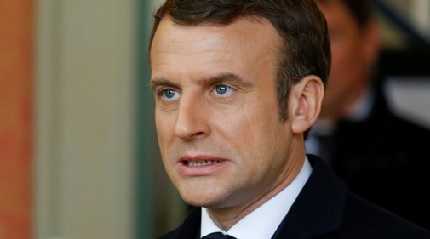
PARIS, April 8 (Reuters) - France's rising far-right is playing on the fears of the people, President Emmanuel Macron said in his last scheduled interview before Sunday's first-round presidential vote while his forecast lead over far-right candidate Marine Le Pen further evaporated.
The race appeared to be coming down to the two finalists of the 2017 election. Macron entered the race as a clear favourite but appears to have lost ground in opinion polls while Le Pen trends upward.
"They play with the fear," Macron told online news outlet Brut on Friday in a last-minute appeal to progressive-leaning, younger voters. "They make short-term minded proposals, the financing of which sometimes is completely unclear."
Macron, who has spent the past five years wooing the centre-right, suddenly changed course, telling voters he would further shield them from rising living costs and the dangers of Le Pen, whom he labelled a racist.
While Macron so far has kept clear of any direct debate, the two have increasingly taken aim at each other from afar, and neither minced words on Friday.
"There was a clear strategy (from Le Pen's camp) to hide what is brutal in her programme," Macron told Le Parisien in an interview published on Friday.
"Her fundamentals have not changed: It's a racist programme that aims to divide society and is very brutal."
Le Pen told broadcaster Franceinfo that she was "shocked" at the accusation, which she rejected, branding the president "febrile" and "aggressive".
She said her programme, which includes adding a "national priority" principle to the French constitution, would not discriminate against people on grounds of their origin - as long as they held a French passport.
MOMENTUM
Macron is ahead in opinion polls, which still see him as the most likely winner, but his re-election is no longer a foregone conclusion. Le Pen's solid comeback in opinion polls has put her victory within the margin of error in some surveys.
A poll on Friday showed the tightest ever gap in support between the two rivals, with Le Pen seen winning 49% of votes in a likely runoff against the president, her best polling score on record.
The poll, published on BFM TV's website, showed that ahead of Sunday's first round, Macron had lost a further two points to 26% support and Le Pen gained two points to 25%. The poll showed the same trend, of Macron gaining 2% while Le Pen won by the same amount, for the second round.
Hours before candidates and their aides are required by French election law to refrain from making any political statements until election offices close on Sunday evening, there was a growing sense of discomfort among Macron supporters.
"I think we’ll be OK, but it’s going to be a hard one," one minister, who spoke on the condition of anonymity, told Reuters.
Campaign insiders say Macron urgently needs to appeal to a broadest possible voter base before the first round, because coming second behind Le Pen on Sunday would give her strong momentum ahead of the runoff.
Le Pen has centred her bid on purchasing power, softening her image and tapping into the voters' main concern by promising to cut taxes and hike some social benefits, worrying financial markets as she gains momentum in the polls.
Rival far-right candidate Eric Zemmour's radical, outspoken views have helped her look more mainstream and many left-leaning voters have told pollsters that, unlike in 2017, they would not vote in the second round to keep Le Pen out of power.
"They won't necessarily vote for Marine Le Pen, but they don't want to vote for Emmanuel Macron," said Jean-David Levy, the deputy director of polling institute Harris Interactive.
"Marine Le Pen has never been so capable of winning a presidential election."
According to opinion polls, around a third of voters have yet to make up their minds, which analysts say often favours candidates with realistic chances to enter the second round as undecided voters tend to go for what the French call a "useful vote", meaning voting strategically.
Other than Macron and Le Pen, this trend is set to favour far-left veteran Jean-Luc Melenchon who - also on an upward trend - ranks third with around 17% of forecast votes.
Left-wing figure Christiane Taubira, a former minister who dropped out of the race after she failed in her attempt to rally the left behind her, on Friday endorsed Melenchon, saying he was now the left's best hope.
Macron expressed regret on Friday for having entered the race late, saying he had had no choice because of the war in Ukraine.
On his last day left ahead of the first vote, Macron chose to focus on younger voters campaigning around Paris and an evening interview with a social media news outlet.
"The idea is to mark that the youth are behind the president and that he manages to create a dynamic allowing voters on the right to continue to vote for him (...) without mobilising voters on the left against him," said Harris Interactive executive Jean-David Levy.




